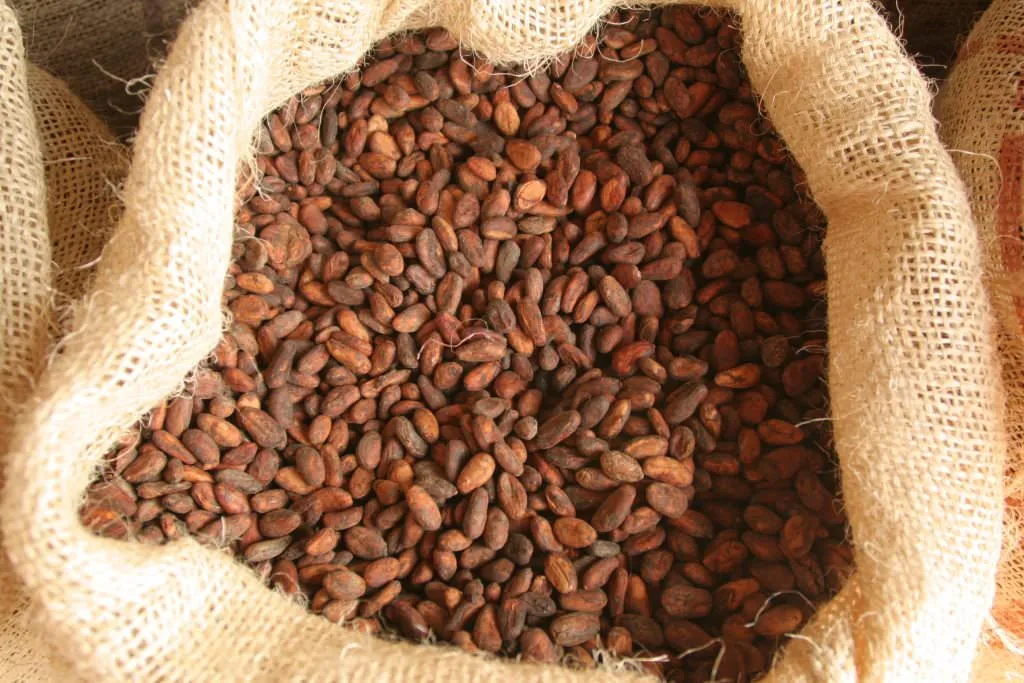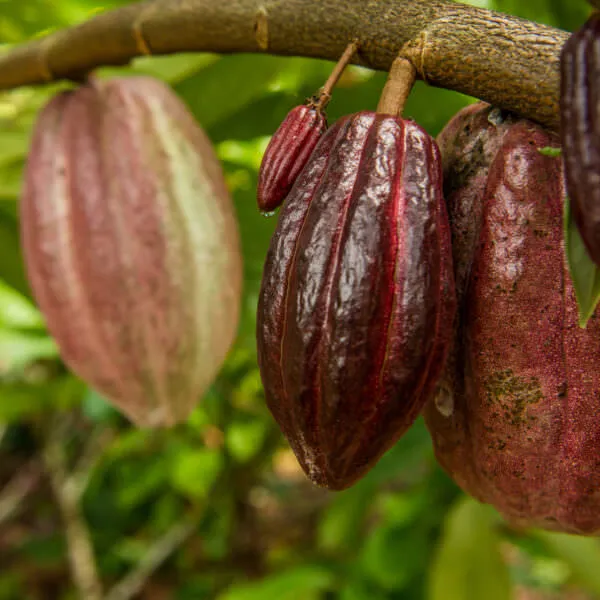The Rainforest Alliance is committed to continuously improve and strengthen its certification programs. After a two-year comprehensive analysis on the necessary evolution of certification, we have developed a set of ambitious and pragmatic approaches, fortified by advanced monitoring techniques, to improve our cocoa certification program.
We are extremely proud of our strengthened program. The plan includes these key elements:
- Cocoa Assurance Plan Phase 2
- Improved livelihoods and the Sustainability Differential
- Fast-tracking of elements in the 2020 Rainforest Alliance Certification Program
- The future of Mass Balance in cocoa
- Shared Responsibility and Responsible Business Practices
- New Rainforest Alliance Certified™ Seal
Below you find the concrete measures on each of the topics.
Cocoa Assurance Plan Phase 2
Extending the pause on new certified farmer groups in cocoa
We will extend the temporary pause on further expansion of our UTZ and Rainforest Alliance cocoa certification programs in Ghana and Côte d’Ivoire for 2020-2021. This enables us to focus our efforts on improving the quality of our current certified groups through controlled growth.
This includes:
- Certificate holders must submit a GPS point for 100% of their farms’ location to the Rainforest Alliance by June 2020;
- Certificate holders and /or first buyers must submit farm polygons where these exist, before June 2020;
- The Rainforest Alliance will implement a deforestation mapping tool to identify and address wider deforestation risk beginning 2021;
- The Rainforest Alliance will limit the growth of existing certified farmer groups – allowing only 10% growth of existing groups through the inclusion of farmers from the same geographic area.
Applying the pause on new certified farmer groups to Nigeria and Cameroon
We will extend coverage of the West Africa Cocoa Assurance Plan to Nigeria and Cameroon where similar risks are likely to emerge. This starts with the following measures:
- A pause on expansion of the UTZ and Rainforest Alliance cocoa certification programs through the addition of new farmer groups;
- Certificate holders must submit a GPS point for 100% of their farms’ location to the Rainforest Alliance, starting with audits in September 2020;
- The Rainforest Alliance will limit the growth of existing certified farmer groups – allowing only growth of existing groups through the inclusion of farmers from the same geographic area.
Introducing allocation system for Certification Bodies
- The Rainforest Alliance will introduce a new risk-based Certification Body allocation system by June 2020. This means that the Rainforest Alliance will allocate specific Certification Bodies to conduct each certificate holder audit;
- The Rainforest Alliance will establish a standard cost model for audits based on among others: minimum audit duration, auditor competence and interview sampling;
- Certificate holders will pay Certification Bodies prior to the audit and specific audit dates will not be announced to certificate holders in advance. Instead, an audit time frame window will be provided.
The allocation system for Certification Bodies will initially be implemented in the cocoa certification programs in Côte d’Ivoire and Ghana. However, if the measure shows significant positive impact it will potentially be expanded to other Rainforest Alliance certification programs.
Strengthening assurance by improving audit quality and certificate holder compliance monitoring
- Increase monitoring by independent organizations, targeting all Certification Bodies with the focus on those auditing high-risk farmer groups, with active follow up of required improvements;
- Provide regular monitoring of certificate holder groups by Rainforest Alliance staff to identify risks and target additional verification and support where needed.
The Rainforest Alliance aims to apply the learnings from these actions to all its certification programs in the future.
Investments by the Rainforest Alliance
For the benefit of the West Africa Cocoa Assurance Plan, the Rainforest Alliance will:
- Invest an additional $2.1 million over two years to strengthen assurance through increased Certificate Holder and Certification Body monitoring, improved risk assessment tools and systems, and eleven new staff to support cocoa assurance (six based in African countries and five in Amsterdam);
- Undertake third party supply chain analysis for companies with sourcing operations in Côte d’Ivoire and Ghana to identify ways to improve assurance around first mile traceability and other priority risks in the supply chain including deforestation and child labor;
- Implement new IT and data systems for certificate holder Internal Management Systems that will be rolled out in the new standard from June 2021;
- Promote expanded use of IT based tools for first mile traceability;
- There is a three-year, $5 million fund to support cocoa farmers and help preserve the local landscapes in West and Central Africa. This Africa Cocoa Fund (ACF) will create measurable, long-lasting positive impact by building the capacity of those certified cocoa farmers who most need assistance to implement our certification standards for sustainable agriculture. The ACF will also support select sustainability projects for cocoa farmers and their landscapes beyond our certification requirements, to achieve further positive impact.
Tackling deforestation
Deforestation is a major issue in West Africa’s cocoa sector. Farmers facing poverty have moved into protected forest in search of more fertile land. The historical lack of enforcement around protected areas has also contributed to ongoing deforestation. The Rainforest Alliance does not allow certification of cocoa farms in Protected Areas, unless farmers and groups have permission from the national government. As part of our ongoing efforts to tackling deforestation, the Rainforest Alliance is taking strong measures to identify and address the risk of deforestation in certified supply chains.
In 2019 we required all UTZ and Rainforest Alliance certified groups in Cote D’Ivoire and Ghana to provide GPS locations for at least 50% of their farmers to check if they have farms in Protected Areas or zones at risk of deforestation. The Rainforest Alliance has conducted analysis of the GPS points of certified groups in Cote d’Ivoire and Ghana against government issued maps of protected forests in each country, to identify any risk of encroachment in Protected Areas. We have also analysed the GPS points to identify risks of deforestation based on Global Forest Watch maps of tree cover loss since 2015.
In April 2019, 84 groups were found to have farmers in protected areas. This was reduced to five by January 2020 and these certificate holders are currently addressing this issue. In 2020 all certified groups are required to supply GPS points for all group members. In April 2020, the Rainforest Alliance suspended 30 Certificate Holders for not providing the required GPS information to enable the risk assessment.
In May 2020 we also provided all certified groups in Ghana and Cote d’Ivoire with maps using their GPS points to show the risk of deforestation and encroachment in Protected Areas. The assessment included recommended actions for groups to mitigate the risk of deforestation and encroachment in protected areas. These maps will also be provided to auditors so they can check during the annual audit process that groups have addressed the issues identified. The Rainforest Alliance monitoring staff will also be following up on groups identified as having a risk of deforestation and encroachment to check that mitigation measures are being taken.
Next steps in 2021 and beyond
Based on the learnings from the implementation of the West Africa Cocoa Assurance Plan, the Rainforest Alliance will roll out relevant measures and learnings to additional certification-led priority sectors and geographies in 2021.
Sustainability Differential
The Rainforest Alliance is introducing a mandatory Sustainability Differential, or a cash amount per metric ton paid to individual farmers, under our new 2020 Certification program. You can find detailed information about the Sustainability Differential here.
Fast-tracking of elements in the 2020 Rainforest Alliance Certification Program
In June 2020 we will publish our new Certification Program which will introduce several new requirements, becoming mandatory in mid-2021. As part of the new measures to strengthen our cocoa certification programs, we will implement some of these requirements by October 2020:
- Rainforest Alliance Certified farmer groups are required to implement a Child Labor Monitoring and Remediation System;
- Double farm cocoa certification (UTZ and Rainforest Alliance) will be eliminated for cocoa in West Africa.
The future of mass balance in cocoa
The Rainforest Alliance will move toward a country of origin matching mass balance approach beginning Q3 2020.
Shared responsibility and responsible business practices
The Rainforest Alliance is working towards greater shared responsibility across supply chains. We are seeking to fundamentally change the dynamics within the existing supply chain system by sharing the responsibility for sustainability improvements at all levels, from the field to company boardroom. With this in mind we will introduce the following measures for all Rainforest Alliance certification programs:
- First buyers in the supply chain will need to report on annual certification investments in specific areas. The details of this are to be finalized but will potentially include: implementation of digital Internal Management System, implementation of a Child Labor Monitoring and Remediation System, collection and validation of GPS data and audit costs. This is to give supply chain actors access to data for better risk mitigation and reporting, and the ability to make more specific sourcing claims based on the performance of their supply chain;
- The Rainforest Alliance will facilitate more transparency on reporting of the Sustainability Differential throughout the supply chain.
New Rainforest Alliance Certification seal
The Rainforest Alliance has introduced a refreshed and modernized Rainforest Alliance certification seal to be used on product packaging by companies. As part of the new measures to strengthen our cocoa certification programs, we will:
- Accelerate the launch of the new seal for Rainforest Alliance Certified cocoa products, linking the access to and use of the new seal to the new farm and supply chain requirements as described above;
- Share the new seal, usage guidelines and technical guides with companies by May 2020;
- Allow product packaging with the new seal to be sold from September 1, 2020;
- Require the phase out of the existing Rainforest Alliance Certified seal and the UTZ label on cocoa products beginning September 1, 2020;
- Launch a consumer and company marketing campaign around the new seal a in September 2020.
Read more about the new Rainforest Alliance certification seal, as well as the timelines for transitioning and phasing out the current Rainforest Alliance Certified seal and UTZ label here.

Your Questions, Answered
To provide guidance to certificate holders and certification bodies on these measures to strengthen the cocoa sector, view our Q&A.



